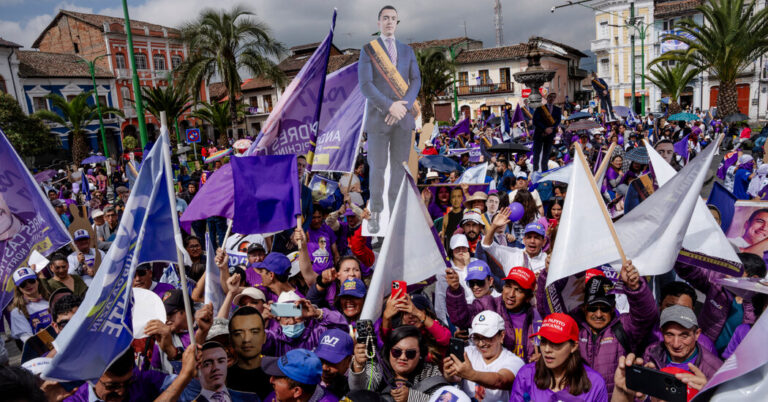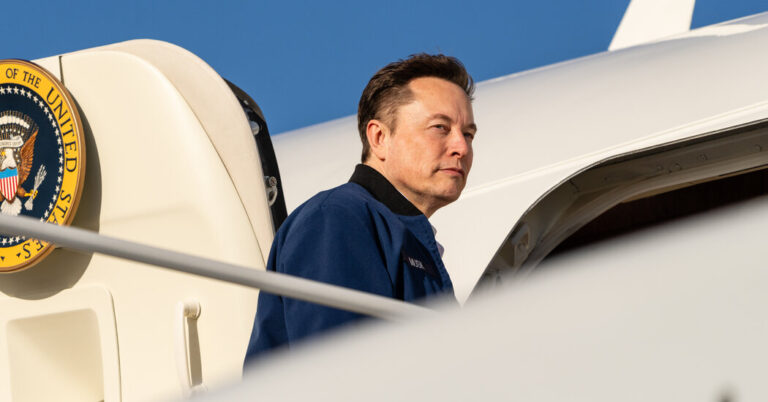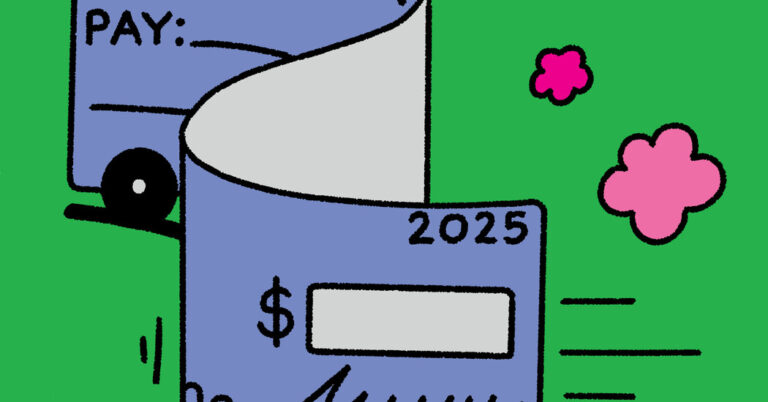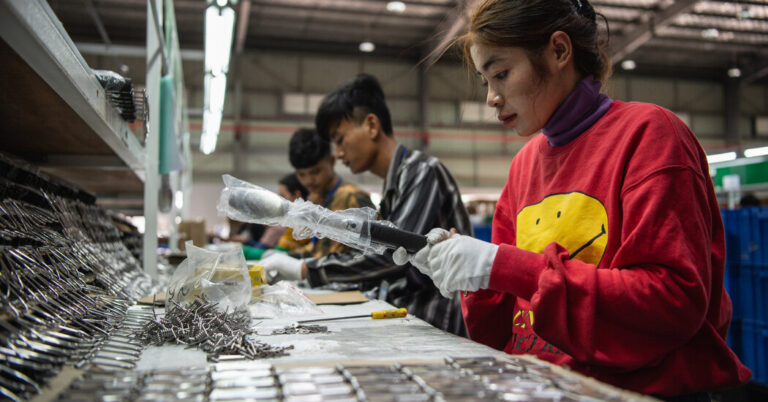Look for a more emboldened president compared to the Trump of 2017.
Source link
7 things to watch for during Trump’s joint address to Congress
Will Trump’s Auto Tariffs Make Buying a Car More Expensive? Here’s What Shoppers Should Know.
“It’s a crazy situation for consumers, and even more difficult for manufacturers,” said Patrick Anderson, chief executive of the Anderson firm.
The impact of the tariffs would vary by car model, since some rely more on imported parts than others. But rather than vastly increasing the price of specific vehicles, the industry is likely to spread increases across all types — “like peanut butter” — to smooth out the price increases, said Tyson Jominy, vice president of data and analytics at the market research firm J.D. Power. Mr. Anderson said manufacturers would “almost certainly cut back” on models that became significantly more expensive.
What if I want to buy a car this year?
Much remains uncertain, including how long the tariffs would stay in place. “We literally have no idea,” said Joseph Yoon, consumer insights analyst at the automotive site Edmunds.com. So if a new car wasn’t on your radar, there’s no need to rush to buy one, he said. A car is an expensive purchase. It’s important, he said, to take time to research models and get one that fits your needs and your budget. “Don’t panic-buy a car valued at $47,000.”
Still, if you were planning to shop for a new car in the next few months anyway, and the model with your preferred features is available now, it may make sense to buy sooner rather than later. Jennifer Newman, editor in chief of the online car shopping site Cars.com, said that inventories of new cars were plentiful and that tariffs shouldn’t affect vehicles that were already sitting on sales lots. “If you’re thinking about buying a car, you need to be shopping now,” she said.
And if you’re interested in an electric vehicle or a plug-in hybrid, now could also be a good time to consider one because you may qualify for a federal tax credit of up to $7,500 if you buy or lease a new one. (The Trump administration has said it aims to reduce or repeal the credit, although Mr. Trump also went on television last month to announce he is buying a Tesla.) But make sure an E.V. truly “suits you,” said Jake Fisher, senior director of the Consumer Reports auto test center. Weigh factors like how far you typically drive, he said, and whether you’ll have access to a charger at home or at work.
Ecuadorean President’s Opponent Contests His Re-Election Win
Ecuador’s president, who unexpectedly surged in the polls to secure a shortened term in 2023, was declared the victor of the presidential election with a decisive lead on Sunday in a race that showed voters’ faith in his vows to tackle the security crisis with an iron fist.
Daniel Noboa, 37, defeated Luisa González, 47, the handpicked successor of former President Rafael Correa.
Both candidates accused the other of electoral violations throughout the election season, and Ms. González said she would not recognize the results of the election, in a speech from the headquarters of her party, Citizen Revolution.
“I want to be very clear and emphatic: The Citizen Revolution has always recognized a defeat in the last elections when polls, tracking and statistics have shown it,” Ms. González said. “Today, we do not recognize these results.”
Mr. Noboa celebrated his victory from the coastal town of Olón.
“This day has been historic,” he said. “There is no doubt who the winner is.”
The day before the election, Mr. Noboa declared a state of emergency in seven states, most of them González strongholds, raising fears that he was trying to suppress the vote among her supporters. The declaration restricts social activities and allows police and military to enter homes without permission.
The president said the measure was in response to violence in certain parts of Ecuador. Ms. González described it as an attempt to curb political participation.
“Declaring a state of emergency in the middle of an electoral process due to alleged serious internal unrest is very questionable,” said Mauricio Alarcón Salvador, the director of Transparency International’s chapter in Ecuador, who added that the decision should be reviewed by the Supreme Court.
But he said that any claims of electoral fraud “must be substantiated,” something he saw as less likely given Mr. Noboa’s large margin of victory. “It cannot and should not be simply an assertion thrown into the air.”
Mr. Noboa has positioned himself as a law-and-order president but has so far achieved minimal results in tackling the nation’s persistent drug violence and unemployment.
In the past five years, Ecuador has experienced an explosion in violence linked to drug trafficking. A justice system plagued by overcrowding in jails, corruption and underfunding has become fertile ground for prison gangs allied with powerful international drug cartels.
This shift has turned the once-peaceful nation of 18 million into a significant player in the global drug trade, disrupting the lives of Ecuadoreans and altering the country’s status in a volatile region.
At the same time, just 36 percent of Ecuadoreans are adequately employed, according to government data, making the economy a top concern.
Mr. Noboa received 56 percent of the vote, compared with Ms. González’s 44 percent, with more than 97 percent of votes counted on Sunday evening, according to official figures.
In a race that was expected to be tight, Mr. Noboa took a decisive lead early in the night. By 8 p.m., hundreds of his supporters were gathered outside of the national electoral council in Quito blowing horns, waving flags and holding the emblematic cardboard cutouts of his likeness.
At the nearby headquarters of Ms. González’s party, hundreds of supporters were shouting “recount.”
Mr. Noboa projected an image of himself on social media as the law-and-order candidate, but that posture wasn’t reflected in reality, according to Caroline Ávila, an Ecuadorean political analyst.
“On a day-to-day basis, you won’t find people on the streets doing surveillance,” she said. “But you will have a TikTok video reminding you of the last raid.”
Mr. Noboa also sought to cast himself as Ecuador’s best representative on the world stage, emphasizing his ability to build relationships with global leaders, including President Trump.
Mr. Noboa, a Harvard-educated heir to a multibillion-dollar banana empire, took office in 2023 after his predecessor called for early elections amid impeachment proceedings.
He first entered politics just four years ago, when he ran for a seat in the national legislature. In the 2023 presidential contest, he managed to rise from the bottom of the polls to second place in the first round of voting after a strong debate performance. He then beat Ms. González in the runoff.
Ms. González, who served in various positions in the leftist Correa government, is largely seen as the representative of the former president, a divisive figure in Ecuador who led from 2007 to 2017. Many revere Mr. Correa for the booming economy, low crime rates and investment in health and education that Ecuador experienced under his government. But others condemn him for his corruption conviction in 2020 and his authoritarian tendencies.
Junior Yazbek, 39, a car dealership owner, said he had voted for Mr. Noboa because he thought that foreign investment and trade would be higher under his leadership, which he thought were key to boosting Ecuador’s economy.
“We really need good allies, big people like the United States,” he said.
Luis Cando and his wife, Mónica Sánchez, both 39, said they were planning to vote for Mr. Noboa in part because of the economy, which is worsened by the high crime levels.
“To have a small business, you can’t open too late or too early, because the thieves are on the lookout,” said Ms. Sánchez, carrying their infant on her chest.
She was drawn to Mr. Noboa’s promises to combat crime and create job opportunities.
“I hope he delivers on that, too,” she said. “That it’s not just a proposal.”
José María León Cabrera contributed reporting from Quito.
Man Pleads Guilty to Selling Sperm Whale Teeth and Bones
A South Carolina man pleaded guilty on Thursday to importing sperm whale teeth and bones from four countries and selling them in the United States, federal prosecutors said.
The man, Lauren H. DeLoach, 69, of St. Helena Island, S.C., pleaded guilty to Lacey Act and Marine Mammal Protection Act charges for importing and selling sperm whale parts, according to the U.S. Attorney’s Office for the District of South Carolina.
Mr. DeLoach admitted to importing the sperm whale teeth and bones to South Carolina, including at least 30 shipments from Australia, Latvia, Norway and Ukraine, from July 2022 through September 2024, according to court documents and statements made in court.
Mr. DeLoach sold at least 85 pieces on eBay worth more than $18,000 and labeled the items as “plastic” to avoid detection by U.S. customs officials, prosecutors said.
The authorities said they had seized about $20,000 worth of sperm whale parts during a search of his residence.
It was not immediately clear on Sunday how Mr. DeLoach had obtained the items and who then bought them from him. The teeth and the bones are prized for decorations or use in artwork, such as engravings and carvings, prosecutors said.
Sperm whales, the largest species of toothed whale, are found in all deep oceans, from the Equator to the edge of the pack ice in the Arctic and Antarctic, according to the National Oceanic and Atmospheric Administration. Females can grow up to 40 feet in length and males up to 52 feet, the agency said.
Sperm whales have been protected under the Endangered Species Act since 1970 and under the Convention on International Trade in Endangered Species of Wild Fauna and Flora. The Lacey Act makes it unlawful to sell any wildlife that has been illegally imported, prosecutors said.
“Illegal wildlife trafficking is a multibillion-dollar global business that endangers protected animals and fuels organized crime,” said Brook B. Andrews, the acting U.S. attorney for the District of South Carolina. “We will continue to enforce the Lacey Act and the Marine Mammal Protection Act so vulnerable species like the sperm whale are not killed and sold for parts.”
Nathan S. Williams, a lawyer for Mr. DeLoach, said in a statement on Sunday that Mr. DeLoach “regrets his decisions and has accepted responsibility for them.”
Mr. DeLoach faces up to five years in prison and a $250,000 fine on the felony Lacey Act charge, and a maximum sentence of one year in prison for the misdemeanor Marine Mammal Protection Act violation.
The case was the latest involving protected wildlife.
In February, a California couple reached a plea agreement in Butte County, Calif., for violating fish and game laws after wildlife officers on a plane heard them boasting how they had once illegally hunted a mountain lion, and how they were smuggling the skull of an endangered turtle in their carry-on bag, the California Department of Fish and Wildlife said.
Rewiring Britain for an Era of Clean Energy
In a career spanning more than 30 years, John Pettigrew has seen big changes in the electricity industry. He started out in 1991, working to introduce natural gas-fired power plants to the grid, gradually replacing polluting coal plants. .
Now, once again, he is managing a tectonic shift to an electrified economy that runs on renewable energy like wind and solar power. But these sources of power generation are far trickier to manage than their coal and gas predecessors.
“Effectively, what we’re doing is reconfiguring the whole network,” said Mr. Pettigrew, chief executive of National Grid, which owns and operates the high-voltage electricity grid in England and Wales.
Mr. Pettigrew was emerging from a tunnel nearly 20 miles long that National Grid has bored deep underground at a cost of about 1 billion pounds (about $1.3 billion). The shaft, which workers ride through on bicycles, will carry new cables to feed the power-hungry offices and residential communities of London.
Mr. Pettigrew and his company are in the spotlight these days. The Labour Party government of Prime Minister Keir Starmer, which came to power in July, is taking a close interest in the electric power system, which it sees as a primary vehicle for delivering political and economic goals.
A more robust, versatile grid will be crucial not only for tackling climate change but for securing Britain’s place on the cutting edge of artificial intelligence, which requires vast amounts of power to run data centers.
The government aims for 95 percent of Britain’s electricity to come from what it calls “clean” sources like wind and nuclear by the end of the decade, up from about 60 percent in 2023. At the same time, demand for electric power is expected to surge.
“We haven’t started to think about how seriously we need to invest in our core infrastructures for the resilience of our economy in a digital world,” Dieter Helm, a professor of economic policy at the University of Oxford, said in a recent podcast.
The price tag for an electricity system that can handle such changes is around £40 billion a year from 2025 to 2030, according to the government. National Grid alone has filed documents with regulators to spend as much as £35 billion over five years.
National Grid was founded in 1990 when the Central Electricity Generating Board, which managed the power network in England and Wales, was broken up in an era of privatization. (The company, which is listed in London, also has a large business managing power networks in the United States.) Mr. Pettigrew has run National Grid for nearly a decade, but he may be facing his greatest challenge, industry experts say.
“I think there’s a big question about how can they build rapidly enough all this new infrastructure at the same time as maintaining the same standards,” said Edgar Goddard, a former National Grid executive and now a director of EPNC Energy, a consulting firm.
An electrified economy will require a highly reliable grid for a host of reasons, including national security, analysts say. At the same time, critics of renewable energy say that relying on sources of power like wind and solar, which are by their nature variable, creates new challenges for the system.
On April 2, a parliamentary hearing on the Heathrow outage became a venue for executives from the airport and power companies politely dodging blame. Electricity executives said that there was sufficient power available. Alice Delahunty, National Grid’s president for transmission and a key aide to Mr. Pettigrew, conceded that the fast-changing demands being made of the power system called for a careful rethinking about it’s resilience.
Britain’s high-voltage network, like those of other countries, used to be relatively simple, bringing electricity from large generating plants — often near where the coal burned in them was mined — to London and other cities.
Now Mr. Pettigrew is extending National Grid’s tentacles toward the coasts, sometimes through scenic areas, to capture new sources of electricity like the giant offshore wind farms now being built in the North Sea.
He also must make sure the system can carry a lot more power.
Demand for electricity, which has been sluggish in recent years, is expected to double in the coming decades as more drivers take the wheel of electric vehicles and data centers spring up to handle everything from financial services to artificial intelligence.
There is already a long line of wind farms, battery storage facilities and data centers waiting to hook up to the grid — sometimes with increasing frustration. “Their connections process is very poor,” James Basden, a founder of a power storage company called Zenobe Energy, said about the large power operators.
A small industry has sprung up to advise companies on how to navigate the gauntlet of securing access to the grid. “We’re seeing huge demand,” said Simon Gallagher, managing director of UK Network Services, one of those firms.
The government is betting that installing swaths of wind turbines — both on land and in the seas off Britain’s coasts — as well as thousands of miles of high-voltage cables will attract investment, nurture clean tech jobs and reduce the country’s vulnerability to price swings in energy like those that occurred after Russia’s 2022 invasion of Ukraine that led to reduced supplies of natural gas.
Since that invasion, high energy costs have been a major issue in Britain and across Europe, where governments have been forced to spend heavily to help households pay their bills.
Some analysts, though, say the huge costs of installing a new energy system may at least partly cancel out the low running costs of wind and solar. “There’s a lot of infrastructure that needs to be built and that’s going to be paid either by taxes or electricity prices,” said Chris Wilkinson, a senior analyst at Rystad Energy, a consulting firm.
Much is at stake for Britain and the wider clean energy industry. If the government’s ambitions prove unrealistic, that could be a blow to the industry, which is already under fire from the Trump administration in the United States.
It certainly won’t be easy to rewire Britain. National Grid is working on 17 large power projects. Some of the schemes involve laying cables for miles offshore to transfer electricity from clusters of wind farms planned for Scottish waters to consumers in England.
Others involve new power lines marching through rural areas on enormous pylons — a prospect that riles up local residents against both the government and National Grid.
The government is taking advantage of its large majority in Parliament to push through legislation curbing the options of opponents of power projects to pursue what it recently called “meritless cases” in court. The government is also planning to offer up to £2500 in compensation over 10 years to people living near the new pylons.
It often takes many years to push projects through the planning system in Britain. Mr. Pettigrew says that process needs to speed up so that Britain can meet its green energy goals.
To achieve anything close to the government’s targets will require an abrupt change in Britain’s leisurely pace of building infrastructure. Offshore wind capacity, for instance, will need to roughly triple. To bring this clean power to consumers will require adding around 3,400 miles of new power lines to the grid, about twice as much as was constructed in the previous decade.
“The way I would describe it is that everybody has to play their part perfectly over the next five years,” Mr. Pettigrew said.
OpenAI Asks Court to Bar Elon Musk From Unfairly Attacking It
OpenAI asked a federal court on Wednesday to bar Elon Musk from unfairly attacking it through a high-profile lawsuit he filed last year, the latest move in a bitter feud between the artificial intelligence start-up and the world’s richest man.
In a filing in federal court in San Francisco, OpenAI said Mr. Musk had “made it his project to take down OpenAI.” The company requested that the tech billionaire be stopped from taking “further unlawful and unfair action” against OpenAI and asked the court to hold Mr. Musk responsible for any damage he has caused the firm.
The filing was another sign of the acrimony between Mr. Musk, who was a founder of OpenAI, and the company over the direction of the fast-evolving technology. In August, Mr. Musk sued OpenAI and two of its founders, Sam Altman and Greg Brockman, claiming they were putting the commercial interests of the company and A.I. ahead of the public good with the technology.
In a statement, OpenAI said: “Elon continues to use bad-faith tactics in an attempt to slow down OpenAI for his personal benefit. These efforts are anti-competitive and go against our mission, which is why today we filed a countersuit to stop them.”
(The New York Times has sued OpenAI and its partner, Microsoft, accusing them of copyright infringement regarding news content related to A.I. systems. OpenAI and Microsoft have denied those claims.)
Mr. Musk helped create OpenAI as a nonprofit in late 2015, along with Mr. Altman and others. But that partnership fizzled after a battle to control the company and the evolution of A.I., with Mr. Musk leaving the organization. Since then, OpenAI has released ChatGPT and become a major A.I. player with hundreds of millions of users. Mr. Altman has raised billions of dollars for OpenAI to build A.I. technologies.
Last year, OpenAI began working on a plan to shift control of the company from the nonprofit to OpenAI’s investors. Soon after, Mr. Musk sued OpenAI, Mr. Altman and Mr. Brockman, claiming they were breaching the company’s founding contract by putting commercial interests ahead of the public good.
This year, Mr. Musk and a consortium of investors offered to buy the assets of the nonprofit that controls OpenAI for more than $97 billion. OpenAI’s board of directors rejected the bid.
In the filing on Wednesday, OpenAI described Mr. Musk’s bid for the company as “fake” and said he was misrepresenting the company’s efforts to change its corporate structure.
“Musk peddles the false claim that OpenAI is planning to ‘convert’ from a nonprofit into a for-profit enterprise,” the filing said.
Marc Toberoff, Mr. Musk’s lawyer, said in a statement, “Had OpenAI’s board genuinely considered the bid as they were obligated to do, they would have seen how serious it was. It’s telling that having to pay fair market value for OpenAI’s assets allegedly ‘interferes’ with their business plans.”
OpenAI has said it plans to restructure as a public benefit corporation, or P.B.C., which is a for-profit corporation designed to create public and social good.
In a separate move on Wednesday, a coalition of nonprofit, labor and other philanthropic leaders filed a petition to the California attorney general, Rob Bonta, to investigate OpenAI’s attempt to convert the company into a public benefit corporation.
What to Know About Trump’s Order to Phase Out Paper Checks
Paper checks issued for tax refunds, Social Security payments and other government benefits have been dwindling and will soon be eliminated, potentially affecting hundreds of thousands of Americans.
President Trump signed an executive order on March 25 directing the federal government to stop issuing paper checks as of Sept. 30. Instead, government agencies must make payments electronically, by direct deposit to a bank account, debit card or digital wallet.
“This executive order will defend against financial fraud and improper payments, increase efficiency, reduce costs and enhance the security of federal payments,” a White House spokeswoman, Liz Huston, said in an emailed statement.
Most monthly Social Security payments and annual tax refunds are already paid by direct deposit, agency statistics show. Yet the administration said it was further “phasing out” paper to modernize how the government handled money. A fact sheet about the order said the government aimed to switch “from old-fashioned paper-based payments to fast, secure electronic payments.”
The order gives the Treasury Department just six months to carry out the mandate — “a very aggressive time frame,” Steve Kenneally, senior vice president of payments with the American Bankers Association, said on an ABA Banking Journal podcast. The order is nevertheless “welcome,” the association said, because electronic payments are “a much faster, cheaper and safer choice” for consumers and the government.
The Treasury Department did not respond to a request for comment.
Jennifer Tescher, chief executive of the Financial Health Network, said that doing away with paper checks was the right thing to do but that “consumer awareness and help making the shift” would be critical to making the change go smoothly.
“It’s all in the execution,” she said.
The White House fact sheet said the government planned a public awareness campaign to inform federal payment recipients of the change and to offer guidance.
Kathleen Romig, director of Social Security and disability policy at the Center on Budget and Policy Priorities, said she agreed that direct deposit was a “best practice” for secure payments. But, she said, newly announced verification requirements for creating online Social Security accounts could mean more people may need government help to set up the payments.
That could be challenging, given that federal agencies like the Social Security Administration and the Internal Revenue Service are facing significant staff cuts under the Trump administration.
How many paper checks are issued by the government?
The government’s use of paper checks has long been in decline as a result of various federal efforts and the evolution of payment technology. The government tried to make most federal payments, other than tax refunds, electronic in the 1990s, in an initiative known as EFT ’99. But the effort faced resistance, Mr. Kenneally said in the podcast, often from members of Congress who received complaints from constituents who preferred paper checks.
Over time, though, reliance on paper checks has fallen. More than 99 percent of the roughly 69 million monthly Social Security payments are made by direct deposit, according to the latest statistics from the Social Security Administration. Beneficiaries are already required to receive electronic payments except in “rare” circumstances, such as receiving a hardship waiver because of a mental impairment or geographic location, according to the agency’s website.
“The government is largely out of the check business,” Ms. Tescher said.
Still, about 486,000 paper Social Security checks go out monthly. Another 238,000 paper checks are mailed each month to recipients of Supplemental Security Income, available to people with low incomes who are blind or disabled.
Leland Dudek, the acting commissioner of Social Security, said in an emailed statement, “We support this executive order and will comply.”
How many people get tax refunds by paper check?
The majority of federal income tax refunds are sent by direct deposit. As of March 21, the I.R.S. had issued about 55.7 million refunds for 2024 tax returns, of which about 1.9 million, or about 3.5 percent, were paper checks. (The president’s order isn’t expected to affect refunds for this spring’s tax season, which is nearing its April 15 deadline for most filers, an I.R.S. spokesman said.)
The Treasury Department has recently taken other steps to reduce paper, including eliminating the option to use tax refunds to buy the paper version of I bonds, federal savings bonds that protect against inflation.
Are paper checks less secure?
While some people still prefer paper, checks can go astray in the mail and are increasingly subject to fraud. They can be stolen from mailboxes and cashed by someone forging a signature. In one scheme, stolen paper checks are “washed” with chemicals, to remove the recipient’s name and the amount of the check. The thief then inserts his or her own name and a larger dollar amount. Last summer, two former Postal Service employees were indicted on charges that they stole $4 million in Treasury checks from a mail facility at Kennedy Airport in New York, then sold them to others.
What if I don’t have a bank account?
The president’s order specified that “limited exceptions” would be made, such as “for people without banking or electronic payment access.”
“We’ll have to see how the exceptions play out,” said Lauren Saunders, associate director of the National Consumer Law Center.
The number of Americans who are “unbanked,” or lack access to a traditional checking or savings account, has fallen in recent years. Just over 4 percent of households were unbanked in 2023, down from about 8 percent in 2011, according to the Federal Deposit Insurance Corporation.
One reason for the drop is that people can now find low-fee bank accounts through the Bank On program, run by the nonprofit Cities for Financial Empowerment Fund, Ms. Tescher said. The program works with banks nationally to certify thousands of safe, low-cost accounts. You can search online to find one that meets Bank On’s standards.
And Ms. Saunders noted that people without formal bank accounts could already get federal payments via the Direct Express program, through which the government puts payments on a prepaid debit card, allowing recipients of Social Security, disability or veterans benefits to withdraw cash or pay bills.
Direct Express serves about 3.4 million people, most of whom don’t have bank accounts. Its longtime administrator has recently come under scrutiny for poor customer service, and a new bank, the Bank of New York Mellon Corporation, will start running the program this year.
Does the order affect payments made to the government?
The executive order also requires that payments to the government — such as for income taxes and passport applications — must also be made electronically rather than by physical check.
Musicians Who Knew Amadou Bagayoko Pay Tribute With Their Songs
African music lost one of its titans last week with the death of Amadou Bagayoko, a guitarist who recorded with American rock stars, performed at the Nobel concert for Barack Obama, and became a national icon in his home, Mali.
With his wife, the singer Mariam Doumbia, Mr. Bagayoko composed the duo Amadou & Mariam, which rose to international fame in the 2000s and 2010s with hits like “Beautiful Sundays.”
Mr. Bagayoko was 70 when he died last week, of complications from a malaria infection. He and his wife, who is 66, were scheduled to perform across Europe next month. And while their fame has faded in the United States since the peak of their global success, they remained huge celebrities in Europe and in West Africa, where their music inspired generations of artists.
We asked relatives and friends of Mr. Bagayoko for their favorite songs by Amadou & Mariam, and the significance of the guitarist and his music — a blend of blues riffs, guitar solos, and djembe — to them.
‘Toubala Kono’
Cheick Tidiane Seck, a keyboard player who knew Mr. Bagayoko since the guitarist was 14, was in neighboring Ivory Coast for a concert last week when Mr. Bagayoko died.
Mr. Seck opened the concert with “Toubala Kono,” a song he wrote with Mr. Bagayoko, whom he called a “brother.”
But he couldn’t finish performing it, he said in an interview, adding, “I would have collapsed.”
With only a spare, reverberating guitar doing circular riffs, the song revolves around loneliness, a feeling that Mr. Seck said had haunted him since his friend’s death.
‘Mogoya’
Sam Bagayoko is the only one of Mr. Bagayoko’s and Ms. Doumbia’s three children who embraced a musical career. He had toured with his parents and was in Paris to organize their planned concerts in France this summer when Mr. Bagayoko died.
His parents were especially proud of how their songs kept appealing to younger generations, he said in a telephone interview from Bamako, Mali’s capital and the family’s home, where visitors were coming this week to pay tribute.
His favorite song is “Mogoya,” which he composed for his parents to perform with him. In the song, he plays the guitar with his father while his mother sings about daily life in Mali and promises that people often fail to keep.
“It was always an honor to play with my parents, but this was our last collaboration together,” said Sam, who is 45. “I will never see nor hear my father’s guitar anymore.”
‘I Think About You’
Idrissa Soumaoro, a well-known musician and singer in Mali, met Mr. Bagayoko in 1973, when at 19 years old he joined the band Les Ambassadeurs du Motel de Bamako.
He quickly saw that “Amadou was bright and ambitious,” he said.
Later in that decade, Mr. Soumaoro trained Mr. Bagayoko and Ms. Doumbia at a Malian national school for blind people, where they deepened their friendship. (Mr. Bagayoko was blind, as is his wife.)
At the school, Mr. Soumaoro said, they would listen to blues for hours in a rehearsal room, working on tonalities in what Mr. Soumaoro called “research work like I’ve never done with any other musician.”
Mr. Soumaoro picked “I Think About You,” a love song that the duo released in 2005, saying, that the couple’s love “was also part of their success.”
“In it, Amadou sings, ‘I think about you, don’t abandon me,’” said Mr. Soumaoro, who is 75. “He didn’t abandon her, but the sad reality is that he has left her.”
He added, “I hope Mariam will have the strength to bear life.”
Trump officials renew opposition to ruling on Maryland man wrongly deported to El Salvador
The Trump administration on Sunday evening doubled down on its assertion that a federal judge cannot force it to bring back to the United States a Maryland man who was unlawfully deported to a notorious prison in El Salvador last month.
In a brief legal filing, the Justice Department reiterated its view that courts lack the ability to dictate steps that the White House should take in seeking to return the man, Kilmar Armando Abrego Garcia, to U.S. soil, because the president alone has broad powers to handle foreign policy.
“The federal courts have no authority to direct the executive branch to conduct foreign relations in a particular way, or engage with a foreign sovereign in a given manner,” lawyers for the department wrote. “That is the ‘exclusive power of the president as the sole organ of the federal government in the field of international relations.’”
The position taken by Trump officials was not the first time they had tried to defy efforts compelling them to seek Mr. Abrego Garcia’s return from El Salvador. Still, their continued recalcitrance meant that Mr. Abrego Garcia, a 29-year-old father of three, would for now remain at the CECOT prison in El Salvador, where he was sent with scores of other migrants on March 15.
The administration’s stubbornness was also likely to heighten tensions between the White House and the judge overseeing the case, Paula Xinis. Judge Xinis has scheduled a hearing to discuss next steps in the matter on Tuesday in Federal District Court in Maryland.
The conflict has persisted even though the Supreme Court last week unanimously ordered the administration to “facilitate” Mr. Abrego Garcia’s release from Salvadoran custody. Trump officials have in fact already admitted that they made an “administrative error” when they put Mr. Abrego Garcia on the plane to El Salvador in the first place.
The dispute — just one of the legal battles involving Mr. Trump’s deportation plans — threatened to spill over into an official visit from President Nayib Bukele of El Salvador, who is set to meet with President Trump on Monday.
When the Supreme Court ruled on the case last week, it seemed at first like a victory for Mr. Abrego Garcia and his family. But the court’s order contained an ambiguous passage that Trump officials have seized on in their ongoing effort to avoid doing much of anything to ensure his return to the United States.
In their ruling, the justices agreed with Judge Xinis that the White House should do what it could to “facilitate” Mr. Abrego Garcia’s release, but they never defined the specific steps officials should take to actually “effectuate” the plan.
Indeed, they sent that question back to Judge Xinis, cautioning her that as she clarified what the administration should do, her decision needed to be made “with due regard for the deference owed to the executive branch in the conduct of foreign affairs.”
On Saturday, Mr. Abrego Garcia’s lawyers asked Judge Xinis to order the administration to send a plane to El Salvador to pick him up and to have Trump officials travel with him to “ensure his safe passage.”
But lawyers for the Justice Department, in their filing on Sunday, said that the administration should not have to do any of that because it would intrude on dealings between the White House and the Salvadoran government.
“All of those requested orders involve interactions with a foreign sovereign — and potential violations of that sovereignty,” the lawyers wrote. “But as explained, a federal court cannot compel the executive branch to engage in any mandated act of diplomacy or incursion upon the sovereignty of another nation.”
Trump’s Tariffs Leave No Safe Harbor for American Importers
In a world besieged by turmoil, Jacob Rothman thought he had secured a refuge.
Mr. Rothman, 52, grew up in California but has spent more than two decades in China, overseeing factories that make grilling accessories and other kitchen items for Walmart and retailers around the globe. Well before the rest of the business world, he grasped the pressures bearing on the relationship between his native country and the one where he runs his business.
President Trump used his first term to impose tariffs on imports from China. President Joseph R. Biden Jr. advanced that policy. The pandemic exposed the pitfalls of American reliance on Chinese factories for an array of goods, from parts for ventilators to basic medicines.
Mr. Rothman and his company, Velong Enterprises, had correctly anticipated demand for alternatives to Chinese industry. He had forged a joint venture in Vietnam, and two more in India. He had set up a wholly owned factory in Cambodia. Come what may, he figured, he could shift production to limit his exposure to tariffs, conflicts and natural disasters.
“I thought I was really ahead of the game,” Mr. Rothman said this week, still absorbing the shock of the one thing he had not seen coming — a veritable tsunami of tariffs that hit dozens of countries at once. “It’s apocalyptic,” he said. “People don’t know what to do next.”
Even after the White House last week paused most tariffs on every country except China, Mr. Rothman remained shaken. “What does ‘safe’ even mean anymore?” he said. “With a chaos-first foreign policy, even Southeast Asia may no longer be immune.”
He assumed that tariffs could eventually be imposed on the region as the Trump administration treated Southeast Asia as an extension of Chinese business interests.
Among the enduring impacts of Mr. Trump’s sharply escalated trade war was the effective foreclosing of safe harbors. In recent years, as global supply chains have confronted a series of crises — from tariffs, to pandemic disruptions, to obstructions to shipping in the Panama and Suez Canals — multinational companies that sell their goods to the United States have sought to limit their vulnerability to trouble in any single place by spreading around their factory production.
The Trump administration’s broad salvo this week appeared to decimate that strategy. American imports from China face duties reaching 125 percent. Duties on imports from Vietnam were set to increase to 46 percent, and Cambodian goods confronted tariffs of 49 percent. India faced 27 percent levies.
For the moment, the pausing of many tariffs has left China uniquely vulnerable. But importers are cognizant that levies on the rest of the world — and especially Southeast Asia — could be revived. The result is chaos, bewilderment and delay that presages rising consumer prices.
“Supply chains require long-term planning that is nearly impossible in the current environment,” said Ryan Petersen, chief executive of Flexport, a global logistics company based in San Francisco. “So many businesses are paralyzed and craving stability.”
That described the state of play for Mr. Rothman, and the kitchen items his factories make. A college religion major who considered training to be a rabbi, he now finds himself serving as the “Spatula Rabbi,” fielding calls from anxious customers around the world. As recently as last month, he was attending a major housewares trade show in Chicago, manning a booth with his Indian partners behind a banner heralding the benefits of their geographic diversity: “Building the safest supply chain on the planet.”
“I thought we were going to be the solution,” Mr. Rothman said.
Then Mr. Trump unveiled the series of enormous new taxes on American imports.
Mr. Rothman was especially shocked by the tariffs on Cambodia, given its history with the United States — the American carpet-bombing of the country during the Vietnam War, laying ground for the genocidal Khmer Rouge, followed by decades of isolation and poverty.
As the news of the tariffs reverberated last week, a major retailer delayed a $5 million order, Mr. Rothman said. Other customers may retain finished goods in his warehouses, hoping for an easing of the tariffs. He anticipates that orders will slow as much as 30 percent over the next six months.
Mr. Rothman struggles to square the upheaval with the supposed policy aims — limiting American reliance on China, while bringing factory production home to the United States.
He is mulling invitations to consider building factories in the United States, in Mississippi, Utah or Pennsylvania, for example. Walmart has a program that helps factories set up in its home state, Arkansas. But building a factory anywhere in the United States seems risky.
How can he outfit an American factory given the hefty tariffs that now hit imports of equipment and machinery from around the world? How can he hire enough people in an era of mass deportation of immigrants?
Constructing a factory is an expensive and long-term proposition. Should a future American government change the policy, Mr. Rothman’s competitors could use lower-wage countries to make their goods, while he would be stuck with a more expensive setup — a recipe for failure.
“We elect presidents every four years,” Mr. Rothman said. “Factories take at least that long to recover the costs of building. And if the world changes, and we can no longer manufacture in the U.S. in a cost-effective way, what am I doing with a factory in the U.S.?”










